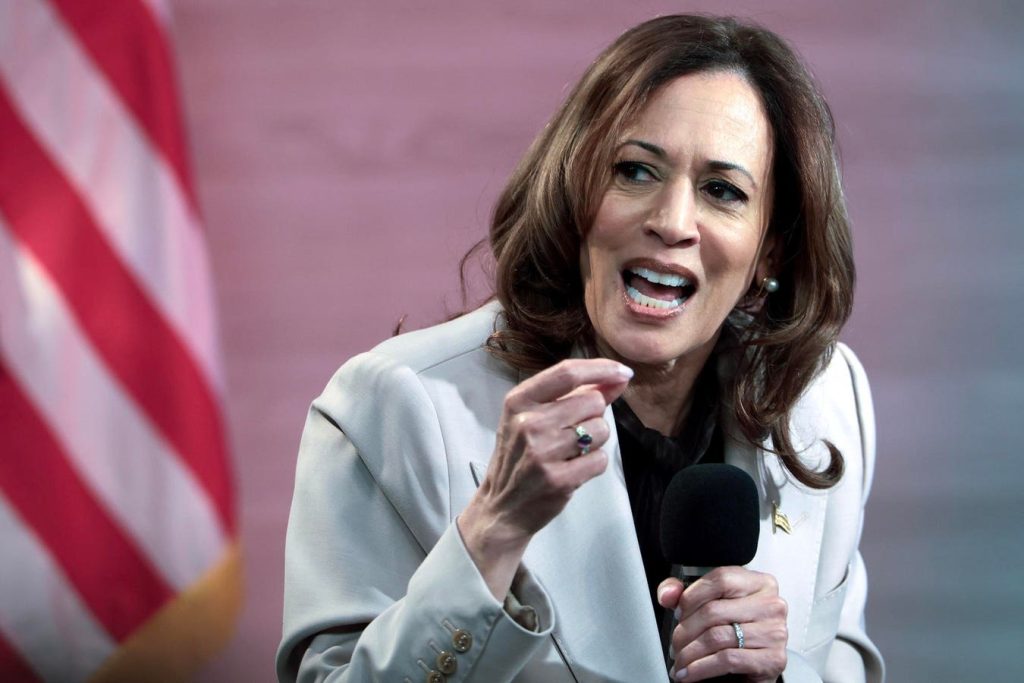PHILADELPHIA, PENNSYLVANIA – SEPTEMBER 17: Vice President Kamala Harris answers questions during a … [+]
Vice President Kamala Harris said she wants to create a home-based long-term care benefit under Medicare. She’s suggesting an historic change in the health care system for older adults and some younger people with disabilities. But the Democratic presidential candidate’s idea raises important political and policy questions.
Harris describes the broad outlines of her plan in a hard-to-find fact sheet here. Oddly, it does not appear anywhere on her official campaign website, at least not where I could find it.
Building On Brookings
As I wrote after she released her plan (and before I saw her fact sheet), Harris seems to be building on a paper published in September by the Brookings Institution. That report, whose authors include four influential health and aging policy experts with deep Democratic connections, described key details of a Medicare long-term care benefit, at least some of which Harris seems to have adopted.
The include:
- Universal eligibility for Medicare beneficiaries but with benefits tied to income and assets
- Benefits for home-based care only
- Triggered by need for assistance with at least two activities of daily living, such as bathing, dressing or going to the bathroom
- Limited hours of covered care. While the Brookings paper did not explicitly set a limit, Harris implied a weekly maximum of about 20 hours.
- Only assistance provided by formal caregivers through approved home care agencies would be covered.
- A total cost of about $40 billion annually. Harris says she’d pay for the new program by expanding Medicare’s ability to negotiate drug prices and raising taxes on US-based multinational corporations.
By assuming Harris would adopt many key details of the Brookings paper, the policy research organization KFF estimates that about 14.7 million Medicare beneficiaries, or about one-quarter of those living in the community, would benefit from Harris’ plan. But KFF says its estimate is highly uncertainty, given key gaps in her proposal.
Here is a closer look at some key issues raised by Harris’ plan:
Income- and Asset-Based Benefits
Linking benefits to income and assets would be unique in Medicare, which ties premiums, but not benefits, to income. This feature is similar the French model of long-term care social insurance where every retiree gets some benefit but the amount is linked to beneficiaries’ ability to pay.
This design would hold down program expenses, as would limiting weekly benefits to 20 hours. These two features also may increase consumer interest in private long-term care insurance, which could cover some of the costs Medicare would not.
They also could attract support from private long-term care insurance carriers and brokers. France’s high-profile but limited government benefit encouraged consumers to supplement that assistance with private insurance. And in the US, limited Social Security benefits are an incentive to save through IRAs and 401(k)s. But the insurance industry still would need to develop wrap-around policies that consumers see as cost-effective.
What Care Would Be Funded?
The Brookings paper would limit coverage to “care provided by formal caregivers associated with home care agencies.” This feature would be consistent with other Medicare benefits, which pay only approved providers. It also would limit costs, perhaps prevent some abuse, and appeal to unions, which want to organize home care workers.
Harris’s fact sheet is more ambiguous. It says, “aides will be designated by Medicare.” Would Medicare pay family caregivers, which some state Medicaid programs and the Veterans Administration already do. If not, her benefit would be of little value in many rural communities, where there often are no formal home care agencies and assistance is provided by unlicensed aides.
Would younger people with disabilities be eligible for the new home care benefit? In general, Medicare is available to those who have paid payroll taxes for at least 10 years and who are age 65 or older. Younger people with disabilities also must pay payroll tax for at least 10 years.
Breaking The Social Insurance Contract
Perhaps most important, Harris would expand Medicare without requiring additional contributions from future or current beneficiaries.
That would be a huge change since a hallmark of social insurance around the world is that it is…insurance. For example, Social Security is based on an explicit agreement: Workers contribute through payroll taxes and in return receive retirement benefits tied to those contributions. While Medicare is funded in part with general government revenues, beneficiaries still must pay taxes for Medicare hospital insurance and premiums for other benefits.
A public long-term care insurance program would maintain this explicit trade-off. But Harris would break that link for this one Medicare benefit.
The Politics
On one hand, it would make the benefit look free to beneficiaries since drug companies and other multi-national corporations would pay, at least in theory. That might attract some support among congressional Democrats. But most Republicans surely would oppose it as a huge unfunded new government benefit. And even if it became law, such a structure would be subject to the political whims of future lawmakers, who could easily kill it—something they have been unable to do with Medicare and Social Security.
Give Harris credit for advancing an important conversation. Like President George W. Bush’s 2003 effort to add a drug benefit to Medicare, this would be a long-needed enhancement that acknowledges how the needs of older adults have changed since the program was created in 1965.
But, even if Harris is elected president, it is a long way between her campaign concept and a functioning Medicare long-term care benefit.

